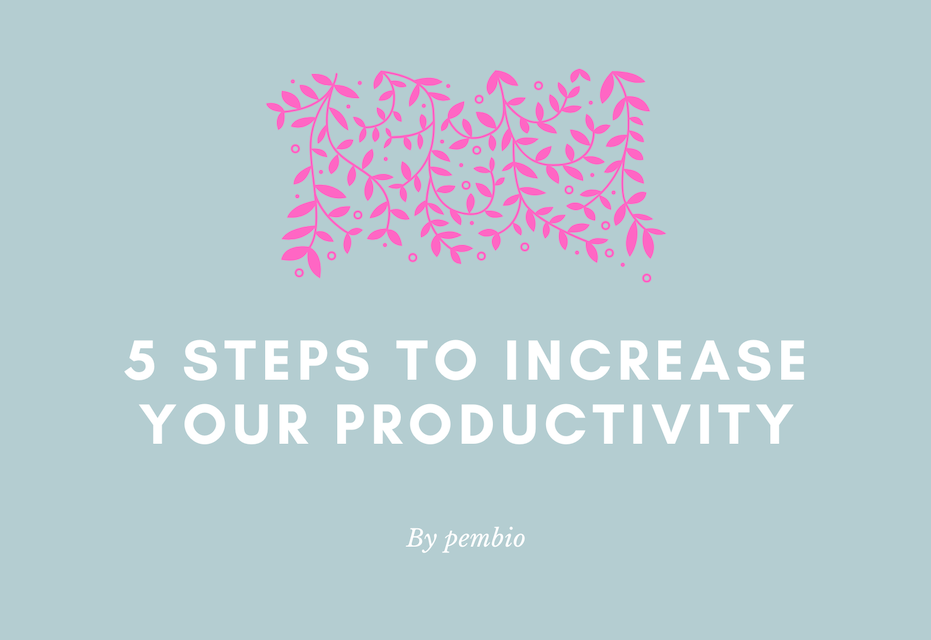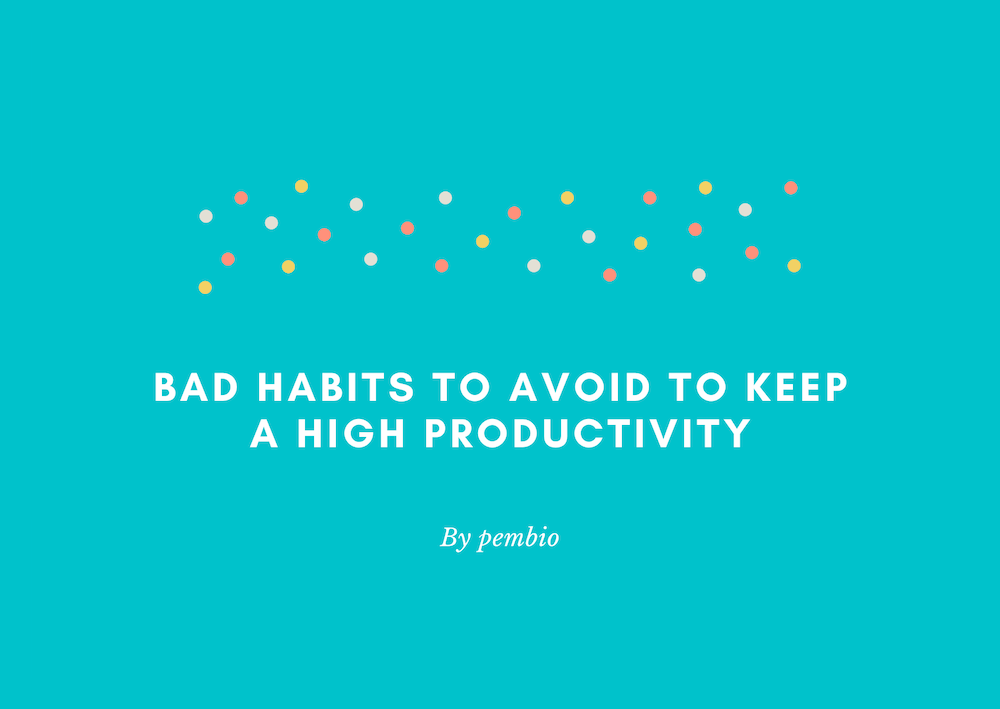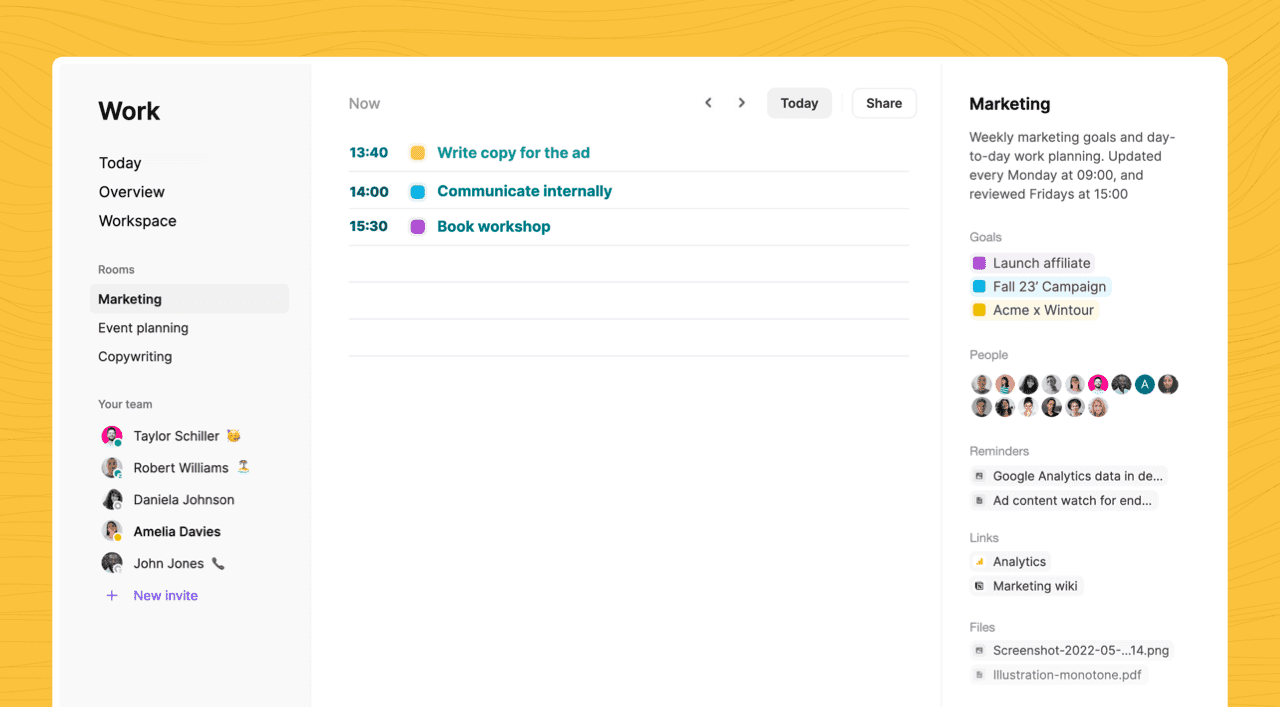Pembio
A curated collection of resources, worksheets and templates within the productivity space.
Get the app ✌️The ultimate guide to productivity boosting!
Increasing your productivity is not working more, but the exact opposite. Being more productive means doing more in less time.
The end goal is to do your job with total efficiency so you can have more free time. Work is stressful, and when you get stressed, you become less productive and tire more easily. This leads to you being in a bad mood and maybe even starting to feel the effects outside of work. You're just trying to get things going, but it makes you feel bad.
Increasing your productivity isn't just about improving your performance at work. What it really means is improving your quality of life. It's not letting work weigh you down. It's about taking good care of yourself and getting better results. Good news! There are tricks that can help you with that, and we're going to show five of them.
5 habits that will boost your productivity

1. Increase your productivity at the start of the day
A productive day is a good day, and it starts right when you wake up. That's why it's good to start getting up a little earlier. It will give you extra time to not have to stress.
It is important that your start to the day is personal and motivating. Visualize how you want the day play out, and do it in a positive way. Talk to yourself and get inspired. Try not to start a workday without having a clear plan of what to do.
2. Find something to focus on
Concentration is a fundamental part of increasing your productivity. It is to focus on something specific. You can make it easier for yourself by defining something to emphasize in your task. It will help you find your own way of doing it.
It's a good idea to come up with themes for your focus. Monday has one, Tuesday another, etc. The famous to-do list also works well.
Some people suggest that you do the least motivating things first – the things that are most annoying, bothersome or difficult. Then you can focus on the rest. Another method is to add some simple items to the start of your checklist to get a head start, and then jump into the more difficult tasks when you’re already in a flow.
3. Identify when you perform at your best
We all have different emotional and biological cycles. There are certain times when you are more awake and motivated. Observe yourself for a few days so that you can identify them.
It helps you a lot to know when you perform at your best. Just by finding out when you have the most energy, you will have taken a giant step.
What comes next is to start scheduling your hard work around these times. This is one of the most effective tricks you can use to increase your productivity.
4. Divide your time and tasks
Time and activities can both be managed more easily if you break them up. Sort them however you like, because it's a trick that never fails. Choose specific times for each task you will do.
However, remember to also leave room for unexpected things, some of the more reactive tasks, so that you can stick to your schedule more easily. Be sure to analyze your work while doing this. Find out the best possible way to do things. Give each task a certain amount of time and stick to it.
It will help you become more organized and give you a consistent sense of accomplishment. It also prevents you from underestimating and overestimating how much time something requires.
By breaking everything down into steps, you will be much more aware of how long everything takes.
5. Identify your repetitive tasks
Each job has its repetitive tasks. Often it's not something you think about, but all jobs have them. The challenge is to identify all the tasks you always do in exactly the same way.
Once you have done that, you can investigate whether it is possible to simplify them. See if there is any way to do more than one thing at the same time.

12 habits to avoid, to increase your productivity
Now, let’s identify what habits you should get rid of to increase your productivity:
First win of the day - don’t snooze.
Sleeping those extra minutes does more harm than good. When you wake up, you get a lot of good substances in your body to get you ready for a new day. By falling asleep again, you slow down that process.
Set goals and prioritize work
Some believe that having many goals is the way to success. But it's not that productive. So instead of having many goals, choose the most important ones.
Don’t plan too much
Many people try to be as productive as possible by planning their entire day in detail. But everything doesn't always go as planned and if something goes wrong, the whole day can be ruined. Instead, try to only plan for part of the day.
Don’t skip planning your day
But to be able to reach future goals, you may need a strategy. Decide what your goal is and then plan the steps you will take to reach that goal.
Control impulsive browsing
Most people have access to the internet when they are sitting and working or studying. But when a random question pops into your head, don't stop what you're doing to look up the answer. Instead, you should write down what you thought about and look it up later.
Multitasking is not being productive
Many people believe that multitasking means being productive. But the fact is that there are very few people who can focus on several things at the same time in an effective way. Instead, it makes us less focused.
Add time slots to check your mail
When you're trying to get work done, getting stuck on emails can cause you to lose 25 minutes of work time. Instead, turn off notifications on your phone for a while when you want to get something done. Adding slots where you manage emails makes you far more proactive during the day.
Moral permission
Whether you're sticking to a work schedule or a new exercise schedule, it's easy to reward yourself with cheating after you've stuck to the new schedule for a while. Instead, try to make your goal a part of your new routine.
Stop attending too many meetings
Going to unnecessary meetings only ruins your flow. If you have to go to a meeting: decide how long the meeting will take and feel free to reduce that time as much as possible.
Don’t sit down all day
Getting fresh air during the day is very important. Some researchers have even started proposing meetings where everyone walks together.
Perfectionism
Many times the fear of not doing a good job is a reason to put things off. So stop thinking that everything has to be perfect, think instead that it's okay to fail to get started. Telling yourself that the task is not that important can also help.
Summary
There are tons of things to do, and not to do in order to increase your productivity. Remember, it’s not about working more, but instead about working more efficiently. Use this guide and identify habits you want to incorporate into your daily life, but also which existing bad habits you want to get rid of. Another general tip is to build out your habits and routines slowly from the examples above, adding too many things can cause you to drop the routine too quickly.
By: Abtin Janinejad

The goal planning app that will skyrocket your productivity
A brand new productivity app - empowering you, or your entire team, to get the most important work done with stunningly simple goal planning.
Get started for free